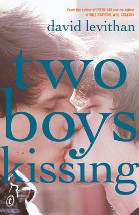Two Boys Kissing by David Levithan

Text Publishing 2013. ISBN 9781922147486.
(Age: 15+) LGTB Themes, identity, loss and bullying.
David Levithan's books have always found new ways to engage readers
with the plight of the LGTB community, particularly its young adult
members. His first, Boy meets boy, 2003 was a celebration of
boys who refused to be defined by society's very 'straight' values.
It was funny, angsty, and ridiculously tolerant. In interviews
leading up to the release of Two boys kissing, Levithan
claimed it's a celebration of the 10 year anniversary of Boy
meets boy, and that he is trying to show how life really is
for young queer people today.
Two boys kissing is the story of Craig and Henry who are
trying to break the Guinness Book of World Record's record for the
longest kiss. This isn't just a chance to find notoriety, it's a
call for support for their friend Tariq. Along the way we also meet
two other couples: Peter and Neil, and Avery and Ryan, one
established and one just starting out. And then there's Cooper -
alone, lonely, and empty.
The narration by a chorus of dead men, lost to the world primarily
because of the AIDs epidemic in the 80s, adds richness and depth,
and of course sadness to the stories of these young men defining
themselves to their family and friends and lovers. This narration
will confuse some people, and alienate others; I can see that. The
'We' is repetitive and ambiguous. This Greek-style of chorus is also
completely ineffectual as they are unable to help our lads navigate
anger, frustration, and despair. They can only observe, comment on,
and compare their lives to these lives, but it works for me. Their
insights are tender and wistful, their regrets are many and varied,
and their wishes are the same as ours: That young people find their
crowd, so they can find themselves, so they can live, and love and
learn. Oh, it's all so wonderful.
Levithan is controlled and contextual when it comes to explicit sex.
He writes for a YA audience so the boys are largely innocent and
playful. There is one (poor) attempt at a seduction, and it is
crucial for the development of Cooper's character and mindset. When
Cooper is rejected, his already spiralling life disintegrates
completely, and it is here that Levithan deviates from his usual
positive and rose-coloured depiction of what it means to be gay.
Although Cooper's story saddened me greatly, it is realistic: There
are many teenagers who don't have supportive families, who don't
have close friends they can call on, who feel like they are
worthless, and who struggle to find a reason to keep going.
This novel is also controlled. It is only 196 pages, yet it
overflows with emotion and wisdom. Every review I write about a
David Levithan book always has a variation of this sentence: I love
the way this man writes.
He isn't for everyone, but he speaks to me. I love the way this man
writes.
Trisha Buckley